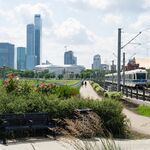thommyjo
Senior Member
Until we become a real region where it feels more interconnected like say a Burnaby and Vancouver, I think it’s very fair to expect high up city workers to live in the city. Same way execs running ETS should at minimum be using transit for commuting and other reasonable trips.i think that's nonsense. just because someone lives in the county of strathcona or st. albert or spruce grove etc. doesn't mean they're not vested in the region overall and in edmonton, particularly if they work there. as well as working there, they probably also attend eskimo and oilers or oil king games, they're kids are likely to attend the u of a or nait or macewan, they are as likely to have friends and family living in the city as not...
besides which if you lived in broadmoor your commute to downtown would be 12 km and if you lived in windermere it would be 24 km.
as for the province's moves regarding athabasca and athabasca university, stupid is doesn't have to be copied by stupid does.
I hear what you’re saying about windemere, you could make an argument pretty soon that St. Albert is better than chapelle/heritage valley in the sense of proximity. But I think the premise of being paid by one tax base and then choosing to yourself pay into a different area is a bit weird. Especially when the reality is that most of this is driven by wealth. EPS high ups get paid 200+ a year from Edmonton tax payers to help make out city safer, then use that money to buy big homes in Sherwood park to avoid “less safe areas” in Edmonton. I think that lacks integrity. Like at least live in glenora or magrath or windsor park.
It’s pretty clear that St. Albert, SP, etc get to avoid having to deal with crime and homelessness because they can push those problems to Edmonton. Yet those residents get all the benefits of being next to a big city. It’s exploiting how things are setup imo.




